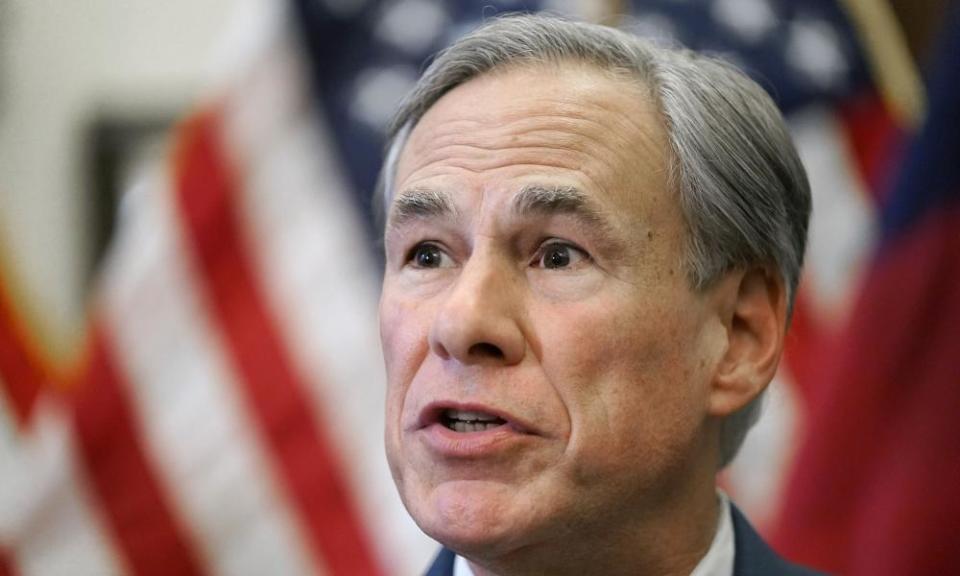Demand soars for monoclonal antibody treatments in states with low vaccination rates

Demand has been soaring for monoclonal antibodies – a treatment to lessen the severity of Covid-19 symptoms – especially among states with larger populations of vaccine-hesitant Americans, as the US continues to struggle with the highly contagious Delta variant in regions with lagging vaccination rates.
The demand for the treatment increased twentyfold in recent weeks because of the sharp rise in new cases accelerated by the Delta variant and lagging vaccination rates, and because of increased awareness of the treatment. But the distribution has, so far, been unequal.
Seven states that have seen Covid-19 rate spikes in recent weeks and months – Alabama, Florida, Georgia, Louisiana, Mississippi, Tennessee and Texas – have used 70% of the federal supply of monoclonal antibodies.
Related: US children aged 5 to 11 on track to receive Pfizer vaccine by Halloween
Several Republican leaders have made the treatments a central part of their pandemic response, even appearing to champion them over vaccinations. The governors of Florida and Texas, Ron DeSantis and Greg Abbott, have touted antibodies even as they oppose mask mandates and decry the federal vaccine mandates on large employers as “illegal” and a “power grab”. (The monoclonal antibodies are also provided by the US government.)
The Covid-19 vaccines are highly effective at preventing hospitalization and death, and they can also cut transmission of the virus – something the antibody treatments can’t do.
Antibodies are also significantly more expensive, at about $2,100 a dose. In comparison, the Covid vaccines cost between $10 and $20 a dose.
Dr Marcus Plescia, chief medical officer of the Association of State and Territorial Health Officials, said it was important to prevent the spread of the virus rather than simply treat the disease comparing the situation to “going upstream and turning off the spigot, rather than dealing with the waterfall”.
“By far the most effective [strategy] is vaccination,” he said. “That’s the way out of this thing.”
Monoclonal antibodies are important treatments for the early prevention of severe symptoms among those who test positive for the coronavirus. The treatment is highly effective when given early in the course of disease, and it may also be given to those who have had significant exposure to a positive case – for instance, a household contact. The treatments received emergency use authorizations among certain high-risk groups over the age of 12.
In the face of a shortage of the treatment, the Biden administration has changed its allocation system, and some states are objecting to the reduced shipments.
The Biden administration said on 9 September it would increase shipments of the treatment from 100,000 to 150,000 doses a week. Days later, the health department announced it would change the way the supply is distributed.
“They’re trying to come up with a way to make the monoclonal antibodies available, but do it in a fair way,” Plescia said.
“There wasn’t a lot of demand for monoclonal antibodies up until a month or two ago. This just popped up, and it’s going to take a while for the manufacturers to respond.

“We may start to see surges in other states, and I think the government was partly intervening to make sure that not all of the supply was being used by states that are currently in the worst situation,” Plescia said.
Some of the states that have recently been hit hardest by the virus have objected to cuts in their supply of the treatment.
DeSantis said the new distribution system would cut Florida’s supply in half, and he vowed to “fight like hell” for more treatments. Florida was due to receive nearly 30,000 doses of the treatment last week, which was still the biggest shipment in the US.
“Alabama’s hospitals are full and under tremendous stress,” said Dr Aruna Arora, president of the state’s medical association. The state received 70% of the treatments it ordered last week, and new limitations on the treatment could add additional pressure to health systems, Aurora said.
The US government shored up supply last week by buying 1.4m more doses from Regeneron and 400,000 doses from Eli Lilly.
A similar allocation system was put into place earlier in the pandemic, but it was dismantled because of low demand. Then, providers could order the treatment from the US government’s supplier, AmeriSourceBergen. But now, the administration is shipping doses to state departments of health.
The distribution process has been “adjusted” several times this year, an HHS spokesperson told the Guardian, and the new system will “help maintain equitable distribution, both geographically and temporally, across the country”.
About 2.4m treatments have been shipped around the country, and at least 1.1m of them have been used.
For months, the antibodies sat on shelves because of testing delays and overwhelmed health systems. It’s important to receive the treatment as soon as possible after a positive test, but lags in testing make that difficult. And hospitals and infusion centers struggled to administer the treatment widely.
“Our role as the government overseeing the entire country is to be equitable in how we distribute,” Jen Psaki, the White House press secretary, said in a briefing on Thursday. “We’re not going to give a greater percentage to Florida over Oklahoma.”

 Yahoo News
Yahoo News 